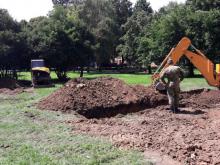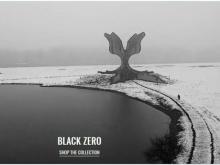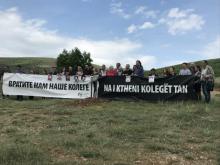Persecution of Serbs
Croatia Finds Suspected WWII Victims’ Bodies in Zagreb
A total of 25 bodies of people suspected to have died in World War II or the post-war period were exhumed in the Croatian capital in July, officials said.
Australian Company Drops Croatian Holocaust Memorial Advert
Australian company Valley Eyewear removed footage of the memorial at the World War II concentration camp at Jasenovac in Croatia from a sunglasses advertisement after a public outcry.
Serb Ex-Soldier Denies Knowledge of Kosovo Massacre
A former Serbian soldier told Belgrade Higher Court that there was no fighting in the village of Trnje in Kosovo in March 1999, when Serbian forces killed at least 27 ethnic Albanians.
Clash Erupts at Protest Against Kosovo Serb Churchgoers
One man was injured and another arrested when Kosovo Albanians in the village of Pjeterq/Petric protested against Serbs displaced in the aftermath of the 1999 conflict who returned to visit the local church.
Kosovo: Displaced Serbs injured in attempt to visit church
Radio Gorazdevac and website KoSSev reported this on Monday afternoon.
The reports said that "a group of Albanians, previously dispersed by the Kosovo police, came back and surrendered the displaced Serbs, who managed to reach the Church of the Holy Trinity - although Albanians had been blocking their way since the morning."
Kosovo Convicts Serb Ex-Policeman of War Crimes
Zoran Vukotic, a Serb former policeman in Kosovo, was sentenced to six-and-a-half years for for the mistreatment and torture of ethnic Albanian civilian prisoners at a jail in 1999.
- Read more about Kosovo Convicts Serb Ex-Policeman of War Crimes
- Log in to post comments
OSCE Urges Action on Journalists’ Murders in Kosovo
The OSCE mission in Kosovo said it wants renewed efforts to uncover the truth behind the kidnappings, murders and disappearances of Serb and ethnic Albanian journalists connected to the 1999 war.
Serbia to finance motion picture about Jasenovac death camp
Jasenovac was one of the extermination camps set up and operated by the Ustasha regime of the Independent State of Croatia (NDH), a Second World War era Nazi-allied entity.
Croatian Concentration Camp Book Tackles Historical Revisionism
A collection of academic articles on World War II concentration camp Jasenovac is being published in a bid to counter “growing trends of historical revisionism” and politicised misuse of Croatia’s wartime past.
Kolinda wants "truth" about death camp determined again
And that would be "a column of unity," she said.
In addition, Grabar-Kitarovic stands for "determining the truth about what actually happened" in Jasenovac - this time "using modern methods."
The Ustasha regime, in power in the Nazi-allied Independent State of Croatia (NDH), established and operated Jasenovac as the biggest of its death camps for Serbs, Jews, and Roma.









